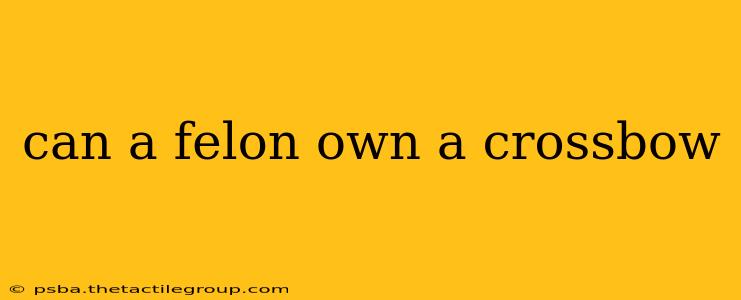Can a Felon Own a Crossbow? The Complexities of Firearm Restrictions and State Laws
The question of whether a felon can own a crossbow is surprisingly nuanced and doesn't have a simple yes or no answer. While crossbows aren't explicitly named in most federal firearm restrictions, the legality hinges on several factors, primarily the specifics of the felon's conviction and the laws of their state of residence.
Federal Laws and the National Firearms Act (NFA):
The federal government primarily regulates firearms under the Gun Control Act of 1968 (GCA) and the National Firearms Act (NFA). These laws generally prohibit convicted felons from possessing firearms. Crucially, the definition of "firearm" under federal law typically excludes crossbows. This is because firearms are legally defined as weapons that expel a projectile by the action of an explosive. Crossbows, using mechanical force rather than explosives, don't fit this definition.
State Laws: The Key Determinant
However, state laws are the critical factor. While federal law may not restrict crossbow ownership for felons, many states have their own statutes that expand on or interpret federal regulations. These state laws can significantly impact a felon's ability to possess a crossbow. Some states might:
- Include crossbows under broader weapon restrictions: Some states may classify crossbows as "dangerous weapons" or "deadly weapons," and felons might be prohibited from owning these under their specific state laws, regardless of the federal definition.
- Have specific prohibitions for certain felonies: Even if crossbows aren't generally prohibited, a felon's specific conviction might disqualify them from owning one. For example, convictions for violent crimes or crimes involving weapons could lead to broader restrictions.
- Vary in their interpretation of "disabilities" for firearm ownership: The phrasing and interpretation of "disabilities" preventing firearm ownership can vary among states, and this could affect whether a crossbow is included.
The Importance of Consulting Legal Counsel
Because of the complexities and the variations in state laws, it's absolutely crucial for any felon considering crossbow ownership to seek legal counsel. A lawyer specializing in firearms laws in their specific state can provide the most accurate and up-to-date information on their legal standing and potential risks. Trying to navigate these laws independently could have serious consequences.
Further Considerations:
- Type of Crossbow: The specific type of crossbow might also play a role. Some high-powered crossbows might be considered more dangerous and therefore subject to stricter regulations.
- Intent: The intended use of the crossbow could be a factor in some states. If the crossbow is intended for hunting, for example, the regulations might differ compared to if it's intended for self-defense or other purposes.
In Conclusion: While federal law generally doesn't prohibit felons from owning crossbows, state laws hold the key. The only definitive answer to whether a felon can legally own a crossbow will come from consulting with a legal professional familiar with the relevant state and federal laws. Ignoring this advice could lead to serious legal repercussions.

